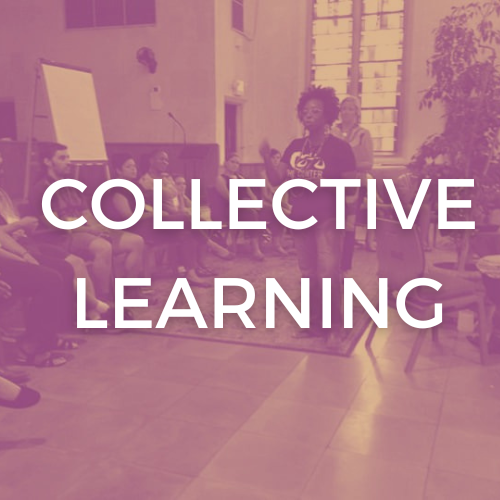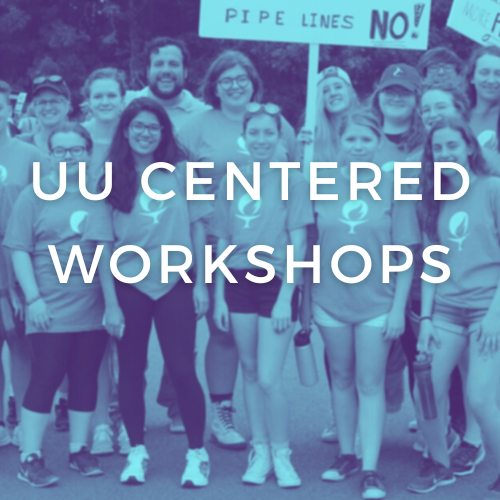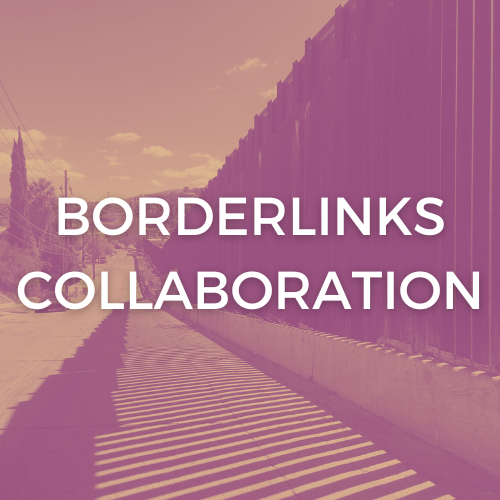UUCSJ offers workshops to congregations, UU State Action Networks, and other groups interested in deepening and strengthening their justice work
Information
Workshops require a minimum of 10 and a maximum of 25 participants.
A UUCSJ Program Leader will be present at every workshop and groups will have the option to receive additional coaching from UUCSJ following their workshop, for continued support.
Registration Pricing: Individual registration fees are on a sliding scale, based on your assessment of your ability to pay. Those who pay at the “Sponsor” level are making a donation to help those in financial need for this event. Those who pay at the “Sustainer” level are paying the base cost to run the event. The “Supporter” level is available for those who would like to support our work, but need to pay a little less.
If you are interested in group pricing or have any questions about the scale, please let us know!
| Sponsor | Sustainer | Supporter |
| $35 | $25 | $15 |
Please remember that for a sliding scale to work, we need the same number of people with the means to generously pay more to balance the needs of those who can afford less. This is one way we try to build Beloved Community!
For more information on our workshops, please email info@uucsj.org, or call us at (617)301-4347.
Workshops Offerings

How Do We Imagine Justice?
How Do We Imagine Justice? explores how groups and individuals recognize that imagination is a practice and we need to cultivate our imaginations in their fight for justice. adrienne maree brown, in her book Emergent Strategies, wrote that “I often feel I am trapped inside someone else’s imagination, and I must engage my own imagination in order to break free.” This workshop provides a framework that helps individuals and groups break free from the “someone else’s imagination,” get a clear understanding of how our creativity and imaginations guide us on our path towards justice.
This workshop is designed for congregational groups (including social justice committees, ministers, and religious educators), activists and community organizers, and anyone who desires to root their justice work with creativity and imagination.
Settler Colonialism 101: How Did We Get Here, Where Are We Going?
We will guide participants through the beginning stages of thinking carefully about their connection to the ongoing structure of settler colonization, and about how to get in good relationships of accompliceship and solidarity with Indigenous struggles. The workshop is designed for settlers of all ethnic/racial backgrounds in, and adjacent to, Unitarian Universalist communities and faith practices.
All are affected by settlement. All on Turtle Island need to figure out how to resist complicity and act in accompliceship (for settlers of all ethnic/racial backgrounds); and continue to claim agency and sovereignty (for Indigenous folks). Our session will offer opportunities for listening to facilitator stories, for journaling reflection and small group discussion, as well as full group discussion. We will provide a shared folder of readings, videos, and activities, some of which we will ask participants to engage with, most of which are designed to offer next steps in their learning process.
Time Estimate: 2 hours
Community Action Circles
Community Action Circles (CAC) serve as a way to practice gathering online to take collective action together as well as a training-by-doing for leaders of State Action Networks, congregations, and local accompaniment groups who are eager to experiment with new tools for helping community members feel connected and motivated to concrete actions from grassroots partners.
This has been an iterative process that we have learned from other organizers and are eager to keep adapting for different groups’ needs, including youth groups, and groups working justice issues related to criminalization, immigration, and/ or climate justice.
ARTE Social Justice Virtual Mural Tour
UUCSJ and ARTE (Art and Resistance Through Education) invite you on a Social Justice Mural Tour of NYC, including some of ARTE’s own work in East Harlem! During this interactive, participatory workshop, participants will: Discuss what constitutes public art and explore the intersection of public art and social justice; Understand the use of artivism (art + activism) as a tool of social justice; Spend time analyzing artwork by activists focusing on immigrant rights & mass incarceration; Leave with a better understanding of how public art can be used as a tool for activism in their own communities. Art and Resistance Through Education (ARTE) is a grassroots, community-based of New York that engages young people to amplify their voices and organize for human rights change through the visual arts.
Grounded & Resilient Organizers Workshop (GROW)
The G.R.O.W. Fellowship will equip UU (and UU adjacent) young adults of color and white young adults with the skills, spiritual grounding, and community to engage in justice work within and beyond our Unitarian Universalist faith.
This program is open to all alums of GROW / Thrive / Shift, as well as young adults (ages 18-35) seeking to commit to a spiritually-grounded community of praxis for these times. This offering is hosted by Unitarian Universalist institutions and open to all participants who are excited about integrating spirituality into your work for justice and liberation. Visit the Events Calendar for more information!
The Answers in Our Bodies
The somatics bodyworker MawuLisa Thomas Adeyemo tells us “There is so much that I feel is possible that happens at the level of the body. When we slow down enough to listen to the language of the body, there’s just so many answers that are there.” In a society that so often sees our bodies as separate entities from our whole selves, how do we learn, feel, and know these answers that Adeyemo says our body has? How do we truly engage in healing justice and holistic healthcare if we have learned not to feel what is happening in our bodies? This workshop seeks answers to these questions through feeling and living into trauma-informed self-care and embodiment work. We will go through practices for self and collective embodiment as well as investigate what it means to hold and address suffering and trauma in our bodies.
This workshop is designed for congregational groups (including social justice committees, ministers, and religious educators), activists and community organizers, and anyone who desires to root their justice work in creativity and imagination.
Faith In Action
Faith in Action explores how groups can better organize in order to harness the power at the intersection of faith and justice. It also provides a framework that helps groups better understand their justice work, ensure the work is done in an effective anti-oppressive manner, and firmly root the justice work in Unitarian Universalism and the mission and vision of the church.
This workshop is designed for congregational groups (including social justice committees, ministers, and religious educators) wanting to ground their work more firmly in Unitarian Universalism while deepening their impact.
Following this workshop, groups have the option to receive additional coaching from UUCSJ for continued support.
Speaking Justice in the Language of our Faith
Speaking Justice in the Language of our Faith invites UUs to deepen their understanding of the Seven Principles as it connects to their personal beliefs and ideals, then practice speaking about justice work in way that is deeply rooted in UU values.
This workshop is for Unitarian Universalists who want to become more comfortable speaking about their passion for justice in a way that is deeply rooted in the Seven Principles and Unitarian Universalist values, in preparation for public speaking opportunities.
Following this workshop, groups have the option to receive additional coaching from UUCSJ for continued support.
Saying Yes and Saying No
Saying Yes and Saying No is built around a centering and discernment practice that helps anyone working for justice say NO in order to empower our YES.
This workshop is for anyone working for justice who needs help setting boundaries around what they can and cannot manage. This is especially helpful for activists who feel that their work is too dispersed or overwhelming, and want to be more focused and engaged.
Following this workshop, groups have the option to receive additional coaching from UUCSJ for continued support.


BorderLinks is a bi-national, nonprofit educational organization at the U.S.-Mexico border. The organization focuses on cross-border relationship-building opportunities, immigration issues, community formation and development, and social justice in the borderlands between Mexico, the United States, and beyond.
Immigration History Timeline
This workshop examines U.S policies historically which have both directly and indirectly influenced immigration and migration and how this correlates with current events. This workshop allows for a deeper discussion around the root causes of migration, as well as who benefits from the current system of enforcement and laws. Special attention is paid to how U.S. policies have influenced the U.S/Mexico borderlands.
Canasta Básica (Market Basket Survey)
Explore the prices of everyday groceries in Border Town Mexico in order to compare the cost of those items with groceries purchased in the United States. This interactive workshop leads to discussions on how our food system guarantees low prices for some but not others, and how different it is to shop and eat in Mexico.
Solidarity/Charity
This workshop focuses on providing a space to reflect and address the difference between being a part of the struggle and providing support for those directly affected. We explore the intricacies of social action and contextualize the concepts of charity, “white savior” complexes, and understand what true solidarity might look like. Participants will reflect on the healthiest ways to form long and meaningful relationships in their own communities, that will help further our quest for liberation.
Action Planning
Provides a space for participants to plan how they are going to move forward into action either as individuals or as a group once returning to their communities.

